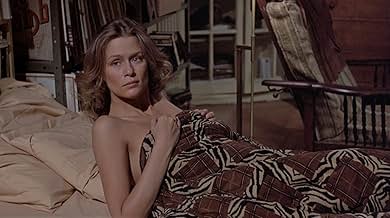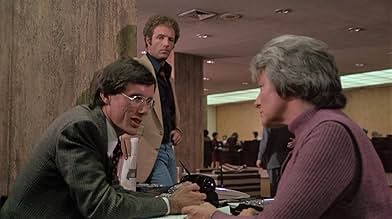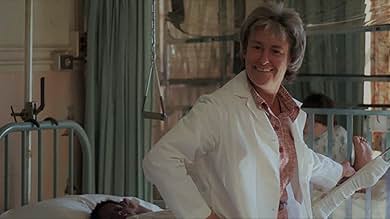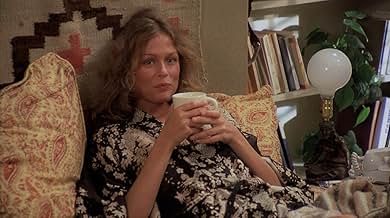NOTE IMDb
7,1/10
6,9 k
MA NOTE
Axel Freed est professeur de littérature et une passion pour le jeu. Quand il perd tout son argent et en emprunte à sa petite amie, puis à sa mère, il cumule les dettes sans pouvoir s'arrête... Tout lireAxel Freed est professeur de littérature et une passion pour le jeu. Quand il perd tout son argent et en emprunte à sa petite amie, puis à sa mère, il cumule les dettes sans pouvoir s'arrêter de jouer.Axel Freed est professeur de littérature et une passion pour le jeu. Quand il perd tout son argent et en emprunte à sa petite amie, puis à sa mère, il cumule les dettes sans pouvoir s'arrêter de jouer.
- Réalisation
- Scénario
- Casting principal
- Récompenses
- 1 nomination au total
Avis à la une
I saw this movie back in 1974/75 when it was released. I was already a Caan man. My comments are just random tidbits. Burt Young would go on to join Caan in 1975's The Killer Elite". Monkey (London Lee) was a stand-up comic who appeared numerous times on the Ed Sullivan show in the 60's. Lauren Hutton would trade Caan for Burt Reynolds in Gator. Caan earlier had beat out Burt for the role of Sonny Corleone. The line I remember most from this film is when Axel's mother is trying to get a bank loan to fund his gambling debt. There are some bureaucratic snafus and the bank officer isn't sure he has the proof to approve the loan to mom. Caan says "I came out of her womb and I know she's my mom. Now give her the god... money!".
This is a film that must be seen to be believed.
Caan is extraordinary; the emotional truth of this film penetrates each line, each scene...The most searing and intense and exact ending in modern film. The straight-forward telling of a professor with a gambling problem does not prepare one for the scale and price of betrayal and redemption of human emtions that are portrayed. A stunning film.
Caan is extraordinary; the emotional truth of this film penetrates each line, each scene...The most searing and intense and exact ending in modern film. The straight-forward telling of a professor with a gambling problem does not prepare one for the scale and price of betrayal and redemption of human emtions that are portrayed. A stunning film.
In pop culture, before you had to "know when to walk away, know when to run," THE GAMBLER was synonymous with a Fyodor Dostoevsky novel and transcended into this 1970's film written by James Toback, directed by Karel Reisz and starring James Caan as university professor Axel Freed...
But Axel's real story isn't his job, but his vice, practically a religion: that of gutsy yet brainless gambling...
An addiction making him the user/loser of other people's money, including his own mother (more of a flirtatious step sister). But, while it's great seeing Caan facing the dark side of human nature, there's a lot to be desired when, for instance, he gets in over his head... and then some...
Shady characters come and go and sometimes return, ranging from Burt Young to Paul Sorvino, but their threats aren't all that... threatening. And while each performance is fitfully capable, it's as if the bookies, along with the audience, are passive observers to Axel's reckless and often ridiculous impulses.
Scenes with an extremely patient girlfriend/ingenue Lauren Hutton are overlong and distracting; her part feels tacked-on, mostly. And inside the classroom, as lecturer, Caan doesn't seem completely legit; he pulls off the roguish gambling addict better than a member of such a prestigious academia (plus he's an author), looking more like a tough guy football coach doubling as teacher...
Meanwhile, sporadic and strategic illegal backroom gambling sequences (filled with mafioso-looking inhabitants) lack the kind of severely desperate tension that these grungy locations aesthetically promise...
With so much to lose in each hand or roll of the dice or turn of the wheel, we should be biting our nails, and so should he... although a quick trip to Las Vegas does up the ante, injecting a needed dose of existential suspense into the otherwise languid visual prose.
Overall, Caan's steely reactions to the bottom continuously falling out are a standout... albeit kind of a shame since he often slips out of trouble faster than it takes to maintain an edgy pulse throughout; it's like watching a diver swim with toothless sharks...
And yet, if you're a fan of the infectiously likeable square-jawed actor (a perfectly equal hybrid of cult and mainstream cinema) this is definitely an intriguing two-hour melodrama that actually gets better with each viewing. What initially seems rather mundane becomes a voyeuristic character-study with subtle yet calculating finesse...
And given the ensemble-friendly era, there are a host of recognizable actors like one perturbed bookie, Jimmy, played by Carmine Caridi (who Francis Ford Coppola originally had in mind for what became Caan's game-changing role as Sonny Corleone in THE GODFATHER: then switched to a killer cameo in the sequel): He rules a memorable scene providing a deeper glimpse into Axel's addiction, and what might be the consequences...
Then there are future TV-fixtures Antonio Fargas, Lawrence Hilton-Jacobs, Stuart Margolin and Vic Tayback. M. Emmett Walsh also turns up and as a weenie banker is another James... Woods...
Specifically, when playing on cable, Time Warner Cable's top-of-the-screen index description states very simply: "James Caan in a study in self-destruction." And, well... that's pretty much that...
What sets out to be a proverbial X-ray of the soul winds up merely exposing bones. Then again, THE GAMBLER leaves most of the fleshing-out for an impartial and ambiguous audience. Which isn't so bad either.
But Axel's real story isn't his job, but his vice, practically a religion: that of gutsy yet brainless gambling...
An addiction making him the user/loser of other people's money, including his own mother (more of a flirtatious step sister). But, while it's great seeing Caan facing the dark side of human nature, there's a lot to be desired when, for instance, he gets in over his head... and then some...
Shady characters come and go and sometimes return, ranging from Burt Young to Paul Sorvino, but their threats aren't all that... threatening. And while each performance is fitfully capable, it's as if the bookies, along with the audience, are passive observers to Axel's reckless and often ridiculous impulses.
Scenes with an extremely patient girlfriend/ingenue Lauren Hutton are overlong and distracting; her part feels tacked-on, mostly. And inside the classroom, as lecturer, Caan doesn't seem completely legit; he pulls off the roguish gambling addict better than a member of such a prestigious academia (plus he's an author), looking more like a tough guy football coach doubling as teacher...
Meanwhile, sporadic and strategic illegal backroom gambling sequences (filled with mafioso-looking inhabitants) lack the kind of severely desperate tension that these grungy locations aesthetically promise...
With so much to lose in each hand or roll of the dice or turn of the wheel, we should be biting our nails, and so should he... although a quick trip to Las Vegas does up the ante, injecting a needed dose of existential suspense into the otherwise languid visual prose.
Overall, Caan's steely reactions to the bottom continuously falling out are a standout... albeit kind of a shame since he often slips out of trouble faster than it takes to maintain an edgy pulse throughout; it's like watching a diver swim with toothless sharks...
And yet, if you're a fan of the infectiously likeable square-jawed actor (a perfectly equal hybrid of cult and mainstream cinema) this is definitely an intriguing two-hour melodrama that actually gets better with each viewing. What initially seems rather mundane becomes a voyeuristic character-study with subtle yet calculating finesse...
And given the ensemble-friendly era, there are a host of recognizable actors like one perturbed bookie, Jimmy, played by Carmine Caridi (who Francis Ford Coppola originally had in mind for what became Caan's game-changing role as Sonny Corleone in THE GODFATHER: then switched to a killer cameo in the sequel): He rules a memorable scene providing a deeper glimpse into Axel's addiction, and what might be the consequences...
Then there are future TV-fixtures Antonio Fargas, Lawrence Hilton-Jacobs, Stuart Margolin and Vic Tayback. M. Emmett Walsh also turns up and as a weenie banker is another James... Woods...
Specifically, when playing on cable, Time Warner Cable's top-of-the-screen index description states very simply: "James Caan in a study in self-destruction." And, well... that's pretty much that...
What sets out to be a proverbial X-ray of the soul winds up merely exposing bones. Then again, THE GAMBLER leaves most of the fleshing-out for an impartial and ambiguous audience. Which isn't so bad either.
Sometimes he wins; but mostly he loses. Gambling is an addiction for Axel Freed (James Caan), a professor of English literature and lover of classical music. The film is set in New York City.
The object of the obsession can be almost anything on which a bet is placed: dice, cards, a basketball game, a college football match. It really doesn't matter. Axel just can't keep from making bets. He's like two different people. In a classroom setting, he is logical and intelligent. But when betting, he throws away the logic in favor of risk taking. In these situations he seems to lack the normal psychological "brakes" that could be applied to his destructive over-betting. In his own words: "I like the threat of losing". And always in the background are the thugs and the con men that lord over Axel, when he borrows to gamble, but can't pay his debt.
Some of Axel's classroom lectures have real thematic value. The ideas relate both to him, and incidentally to some modern-day politicians. For example, a person "... claims an idea is true because he wants it to be true, because he says it's true. And the issue isn't whether he's right, but whether he has the will to believe he's right, no matter how many proofs there are that say he's wrong". Axel continues: "D.H. Lawrence says Americans fear new experience more than they fear anything. They are the world's greatest dodgers, because they dodge their own very selves". Heavy stuff.
Despite a disappointing ending, "The Gambler" is an interesting character study of a personality type that is all too prevalent in modern society. The film's color cinematography is generally dark, in keeping with the film's theme. Overall acting is fine. Paul Sorvino gives an especially convincing performance, as does James Caan. The plot proceeds rather slowly.
Mostly, the film has terrific thematic value. It encourages the viewer to pause and reflect, to ponder, to question one's own motivations. That is a trait lacking in many current movies.
The object of the obsession can be almost anything on which a bet is placed: dice, cards, a basketball game, a college football match. It really doesn't matter. Axel just can't keep from making bets. He's like two different people. In a classroom setting, he is logical and intelligent. But when betting, he throws away the logic in favor of risk taking. In these situations he seems to lack the normal psychological "brakes" that could be applied to his destructive over-betting. In his own words: "I like the threat of losing". And always in the background are the thugs and the con men that lord over Axel, when he borrows to gamble, but can't pay his debt.
Some of Axel's classroom lectures have real thematic value. The ideas relate both to him, and incidentally to some modern-day politicians. For example, a person "... claims an idea is true because he wants it to be true, because he says it's true. And the issue isn't whether he's right, but whether he has the will to believe he's right, no matter how many proofs there are that say he's wrong". Axel continues: "D.H. Lawrence says Americans fear new experience more than they fear anything. They are the world's greatest dodgers, because they dodge their own very selves". Heavy stuff.
Despite a disappointing ending, "The Gambler" is an interesting character study of a personality type that is all too prevalent in modern society. The film's color cinematography is generally dark, in keeping with the film's theme. Overall acting is fine. Paul Sorvino gives an especially convincing performance, as does James Caan. The plot proceeds rather slowly.
Mostly, the film has terrific thematic value. It encourages the viewer to pause and reflect, to ponder, to question one's own motivations. That is a trait lacking in many current movies.
7sol-
A gritty, realistic film about addiction, it has a bit of haunting atmosphere to it, and although awfully dreary and a touch too harrowing for its own good, the film still packs a punch. Caan has a very interesting character, one who understands his own addiction yet still deceives himself, and he gives off a very solid performance, even though his character does come off rather cold and a bit hard to relate to. What the film shows us and what happens is quite predictable, but that does not prevent it from still having potency, and the ending certainly is not predictable, and is actually rather fascinating. The film's music score fits the project perfectly, and the driving sequences depict the character's feelings very well. Certainly this worth checking out, even if it is no cinema masterpiece.
Le saviez-vous
- AnecdotesAccording to James Toback, before his screenplay was accepted at Paramount Pictures, and was making the rounds with actors, Peter Boyle was first interested in playing the lead. Robert De Niro lobbied hard for the role, to the point where De Niro started to dress like the writer. Toback pressured director Karel Reisz to meet with De Niro. After meeting him, Reisz said that he would not, and could not consider De Niro for the role, and if Toback kept insisting, he would not be allowed to collaborate on the film further.
- GaffesAxel knocks the pimp's hat off on the second punch. It reappears on his head on the following one.
- ConnexionsFeatured in WatchMojo: Top 10 Gambling Movies (2014)
- Bandes originalesSymphony No. 1 in D
Written by Gustav Mahler (as Mahler)
Performed by Koninklijk Concertgebouworkest (as The Concertgebouw Orchestra)
Conducted by Bernard Haitink (as Haitink)
Courtesy of Philips Records
Meilleurs choix
Connectez-vous pour évaluer et suivre la liste de favoris afin de recevoir des recommandations personnalisées
- How long is The Gambler?Alimenté par Alexa
Détails
Box-office
- Montant brut aux États-Unis et au Canada
- 1 305 782 $US
- Durée1 heure 51 minutes
- Mixage
- Rapport de forme
- 1.85 : 1
Contribuer à cette page
Suggérer une modification ou ajouter du contenu manquant

Lacune principale
By what name was Le flambeur (1974) officially released in India in English?
Répondre
































